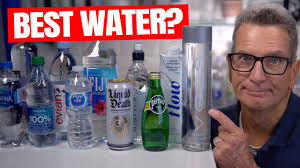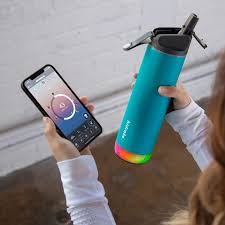In recent years, the health and wellness industry has seen a surge in the popularity of bottled “smart water.” Promoted as a healthier, more beneficial alternative to regular water, smart water brands claim to offer a variety of advantages, from enhanced hydration to added electrolytes and even improved cognitive function. However, despite the clever marketing and attractive packaging, bottled smart water may not be the ultimate solution to your hydration needs. In fact, there are several reasons why it might not be as beneficial as it seems.
Table of Contents
Understanding Bottled Smart Water
Before diving into the potential drawbacks of smart water, it’s essential to understand what smart water is. Generally, smart water refers to bottled water that has been enhanced with electrolytes, minerals, or vitamins. Some brands also incorporate processes like vapor distillation, which is intended to purify the water and mimic the hydrating properties of natural spring water.

Electrolytes such as potassium, magnesium, and calcium are added to many smart water brands to aid in hydration and improve taste. Additionally, some varieties of smart water are infused with vitamins like B12, or even antioxidants, to appeal to health-conscious consumers. The idea is that by drinking smart water, you can not only quench your thirst but also gain additional health benefits.
1. The Myth of Superior Hydration
One of the most common claims made by smart water companies is that their products offer superior hydration compared to regular tap water or other bottled waters. However, this claim is largely based on marketing rather than scientific evidence.
While it’s true that electrolytes play a vital role in maintaining hydration and electrolyte balance in the body, most people don’t need to consume additional electrolytes outside of a balanced diet. The average person, particularly one who is not engaged in intense physical activity or suffering from dehydration, gets all the electrolytes they need from food and regular water intake. Therefore, the extra electrolytes in smart water are often unnecessary and don’t provide significant hydration benefits for most consumers.
Furthermore, the human body is highly efficient at regulating water and electrolyte levels. Unless you are sweating profusely from exercise or heat, the electrolytes in smart water are unlikely to make a noticeable difference in your hydration status. In some cases, excessive consumption of electrolytes can even be harmful, leading to imbalances in the body.

2. Environmental Impact of Bottled Smart Water
Another important consideration when evaluating bottled smart water is its environmental impact. The production and disposal of plastic bottles contribute significantly to environmental degradation. Despite many bottled water companies promoting their products as eco-friendly or using recyclable materials, the reality is that most plastic bottles still end up in landfills or polluting our oceans.
According to environmental studies, the production of plastic bottles requires a substantial amount of energy and resources, including water. For every liter of bottled water produced, it is estimated that three liters of water are used. This irony is often lost on consumers who purchase bottled water with the intention of staying hydrated and healthy, while inadvertently contributing to water waste and environmental harm.
Moreover, the transportation of bottled water also has a significant carbon footprint. Bottled water is often transported over long distances, consuming fossil fuels and emitting greenhouse gases. This environmental cost is something that many consumers overlook when choosing smart water over tap water or using a reusable water bottle.

3. The Financial Cost of Bottled Smart Water
In addition to environmental concerns, the financial cost of smart water is another factor that should give consumers pause. Smart water is often sold at a premium price compared to regular bottled water or tap water, with some brands charging several dollars per bottle. Over time, these costs can add up, making smart water an expensive habit.
For many consumers, the perceived health benefits of smart water are not worth the extra cost. Given that tap water in many developed countries is clean, safe, and free or nearly free, the financial savings of sticking to tap water are significant. Even for those who prefer bottled water for convenience or taste, regular bottled water is often a more cost-effective option than smart water.
4. Tap Water vs. Bottled Smart Water
One of the biggest arguments in favor of smart water is its purported purity compared to tap water. Some smart water brands use vapor distillation or reverse osmosis to remove impurities and contaminants, which is marketed as making the water “cleaner” than tap water.
However, in many regions, tap water is subject to strict regulations and testing to ensure its safety for consumption. In the United States, for example, the Environmental Protection Agency (EPA) sets stringent standards for tap water quality, and local water utilities are required to test and report on water quality regularly. As a result, tap water is often just as safe, if not safer, than bottled water, including smart water.
Furthermore, some studies have found that bottled water, including smart water, can contain microplastics and other contaminants that may not be present in tap water. These contaminants can come from the plastic bottles themselves or from the bottling process. Therefore, the notion that smart water is inherently purer or safer than tap water is not always accurate.
5. The Role of Marketing in Smart Water’s Popularity
The success of smart water is largely driven by marketing. Bottled water companies have invested heavily in branding and advertising to convince consumers that their products are superior to tap water and even other bottled waters. This marketing often emphasizes the added benefits of electrolytes, vitamins, and purification processes, while downplaying or ignoring the environmental and financial costs.
Celebrities and influencers have also played a significant role in popularizing smart water. By associating smart water with health, fitness, and luxury, marketers have created a perception that it is a premium product worth paying extra for. However, it’s important to remember that much of this perception is crafted by marketers and may not reflect the actual benefits or drawbacks of the product.

Alternatives to Bottled Smart Water
For those looking to stay hydrated without resorting to bottled smart water, there are several alternatives that are more environmentally friendly, cost-effective, and potentially just as beneficial.
- Tap Water: In many parts of the world, tap water is a safe and reliable source of hydration. Investing in a good-quality water filter can further improve the taste and quality of tap water, making it an excellent alternative to bottled water.
- Reusable Water Bottles: Using a reusable water bottle is a great way to reduce plastic waste and save money. Many reusable bottles are designed to keep water cold for hours and can be filled with tap water or filtered water, offering the same hydration benefits as bottled smart water without the environmental impact.
- Electrolyte Tablets or Powders: For those who do need extra electrolytes, such as athletes or individuals in hot climates, electrolyte tablets or powders can be added to regular water. These products are often more affordable and come in eco-friendly packaging compared to bottled smart water.
- Infused Water: Infusing tap or filtered water with fruits, herbs, or vegetables is a natural and healthy way to enhance the taste and add vitamins and minerals. This method allows you to create your own “smart water” without the added costs and environmental impact.

Conclusion: Bottled Smart Water
Rethinking Hydration
While bottled smart water may seem like a convenient and healthy option, it is important to critically evaluate its claims and consider the broader implications of its use. For most people, the benefits of smart water are minimal compared to the environmental, financial, and health costs.
By opting for tap water, reusable bottles, and other alternatives, consumers can stay hydrated in a way that is both beneficial to their health and the planet. In the end, the smartest choice for your hydration needs may not come from a bottle labeled as “smart water,” but rather from making informed, sustainable decisions about how you consume water.
